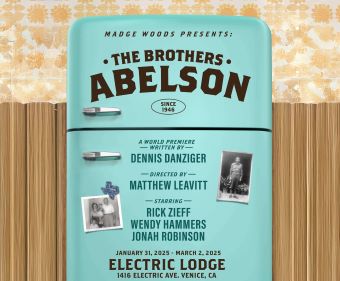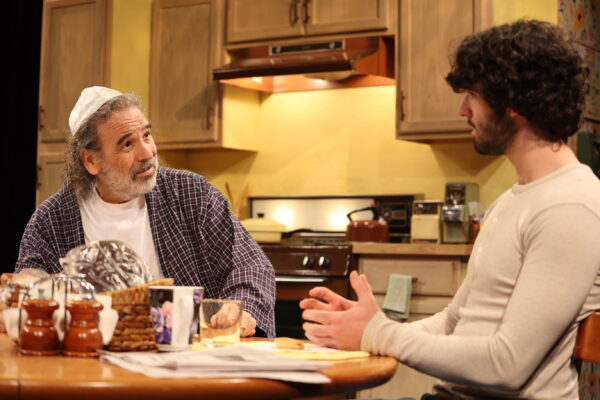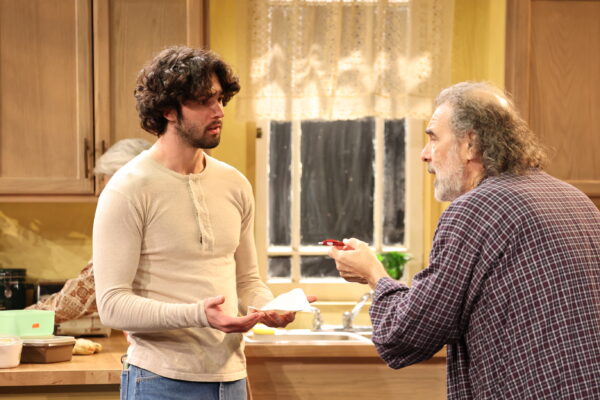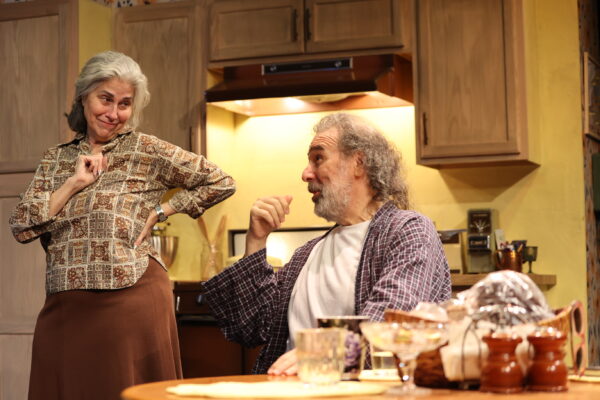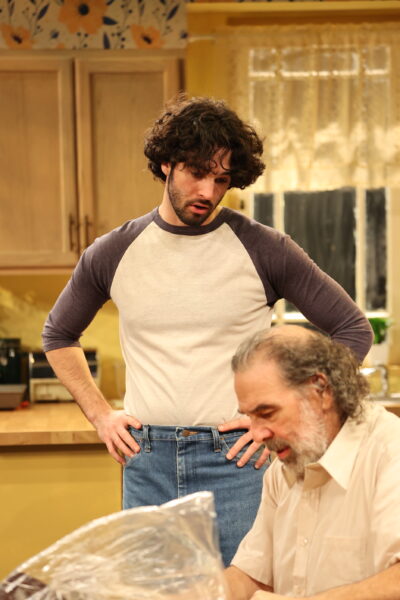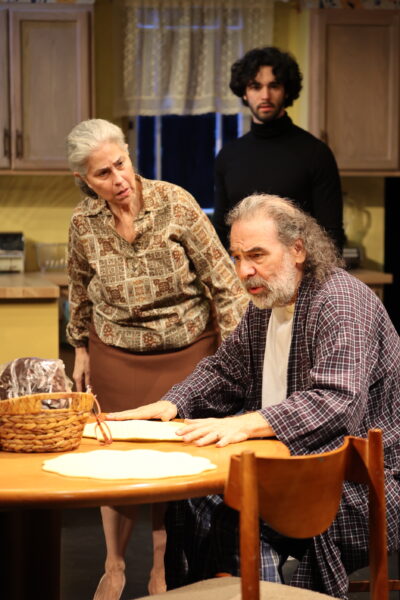A TIME CAPSULE OF GENERATIONAL
LOVE, PAIN, AND RESILIENCE
Every family has a unique mix of personalities, every member knowing their place and how to maneuver others to get what they need. But universal truths define Jewish families of Eastern European descent, shaping a shared culture forged through eviction from their homeland and the necessity of coping in their new country, the United States. No matter where they live, these families remain similarly bound by tradition, love, and conflict. That’s what a culture is all about and why it exists within one’s heart and soul.
Such is the Abelson family in Dennis Danziger’s The Brothers Abelson Since 1946, now at the Electric Lodge in Venice through March 2. The action unfolds in a mid-20th-century suburban kitchen in Texas, 1977, where matriarch Miriam Abelson (Wendy Hammers) enters kvetching about a speck of dirt, flicking it into the trash. But her real frustration stems from her husband’s constant demands and the prospect of Thanksgiving with her dreaded sister-in-law. Hammers fully embodies this weary soul, offering food instead of affection when her son Benny shows up—because, of course, that’s what Jewish mothers do.
Benny (Jonah Robinson), a struggling cartoonist, has returned to the family home from NYC for Thanksgiving, and to visit Isaac Abelson (Rick Zieff), his ailing father suffering from a nervous breakdown—a man who expresses love by writing checks, avoiding emotion at all costs. Benny arrives to find his retired father treating Miriam like a servant, barking orders while lounging in pajamas (“A glass of cold water, no ice!”). After 35 years, Miriam wants out, telling Benny he must stay so she can escape to her sister in Florida. So why hasn’t Miriam left her abusive spouse? “Who’s going to take care of him if I go?” she asks. With Benny home, she sees a chance to leave, but first, he must unravel Isaac’s anger. Despite therapy, Isaac remains bitter, and Benny, desperate to understand, pushes for answers.
Isaac resists discussing the past, and Miriam fears it will give him a heart attack, but Benny insists—only the truth can repair their bond. A worn military jacket from World War II also unlocks buried memories, opening the door to long-overdue healing. Their father-son reckoning forms the heart of this touching, gut-wrenching play.
Meanwhile, Miriam’s biggest concern at the start remains Benny’s lack of a Jewish wife. When Benny—who uses humor to mask resentment while grappling with guilt over taking money from Isaac—reveals his breakup with a Catholic girl, Isaac barely looks up from the newspaper to mutter, “Good.” Soon, Isaac will be scrawling out checks to Benny in anger as writing a check is so much easier than expressing love.
Danziger weaves humor into heaviness, with Miriam’s comic relief arriving at just the right moments—whether offering scalding-hot mandel bread or sarcastically challenging Isaac’s endless demands. A standout moment sees Isaac craving something sweet. When Miriam refuses to whip up a dessert, she dumps ingredients on the counter and points to the recipe box, daring him to fend for himself. Dumbfounded, Isaac just stares at her as if she is speaking a foreign language. Yet, beneath her biting wit lies a woman suffocating under the burden of duty. Her generation settled in silence, standing by their men. Was that resilience—or sacrifice? Then again, perhaps it’s why that generation managed to stay married for much longer than those that followed. Is that so bad? Depends on who you ask.
Directed with deep emotional understanding by Matthew Leavitt, the play runs a brisk 90 minutes. As Benny unearths an old business feud that shattered Isaac’s relationship with his brother, the father-son confrontation—one that will either heal his soul or harm his health—intensifies. Robinson and Zieff deliver powerhouse performances, drawing audible sobs from the audience.
For anyone raised in a strict kosher Jewish household, The Brothers Abelson will hit home, as it did for me. I could relate to Benny’s fury over childhood memories. When he admits hating Isaac for once burning his hand for using the wrong knife to cut a sandwich—and then forcing him to bury the knife in the dirt to rekoshherize it—it reminded me of my grandmother who did the same thing (minus the hand burning). Benny’s attempt to rid the house of pills recalls the helplessness of watching my own dad decline, although I dared not throw them down the sink as Benny did.
And there’s so much more. So many memories. And heartbreak. And love. See it and remember how it was being a kid with your parents and grandparents, the good and the bad that continue to show up as memories that make us who we are.
photos by Sofia Riccio
The Brothers Abelson Since 1946
Electric Lodge, 1416 Electric Ave. in Venice
Fri & Sat at 8; Sun at 2
ends on March 2, 2025
for tickets (starting at $35), visit Abelson Play
Here’s a glossary of terms used in the play:
- plotz – to fall apart emotionally
- kosher – fit or proper as it relates to Jewish dietary law
- Szechuan – relating to a style of Chinese cooking that is spicy, oily, and peppery
- challah – a bread of Ashkenazi Jewish origin, often braided, and eaten on ceremonial occasions.
- mishegoss – craziness, senseless behavior
- schlepping – to carry or haul something around, usually something heavy
- shiksa – a derogatory term for a non-Jewish woman
- farkakteh – something that is horrible or messed up
- Washington Heights – a neighborhood on the far northwest side of Manhattan
- goy – a derogatory term for a non-Jewish person
- mandel bread – Italians have biscotti; Jews have mandel bread. It’s the same thing. The name comes from the yiddish words for almond (mandel) and for bread (brot)
- nosh – to have a snack; or a small amount of food
- Shehecheyanu – a Hebrew prayer that expresses gratitude for unusual or special moments or occasions.
- trayf – non-kosher food
- yahrzeit – the anniversary of the death of a parent or close relative, often observed by burning a candle for an entire day.
- Kaddish – or Mourner’s Kaddish, the Jewish prayer for the dead.
- Shabbos – aka Sabbath, the day of rest. Shabbos/Sabbath begins at sunset Friday night and ends with the appearance of three stars in sky on Saturday night
- bris – a ceremony that involves circumcision and the naming of a Jewish baby on his eighth day of life.
- schvartzes – derogatory word for an African-American
- Jerrys – derogatory name for German soldiers
- Henry Street Settlement – a not-for-profit social service agency on the Lower East Side of NYC
